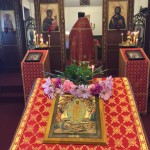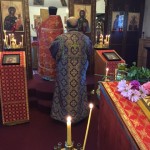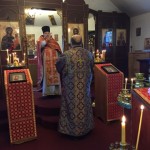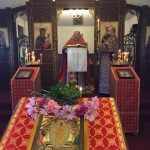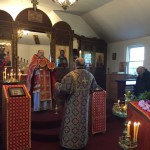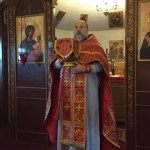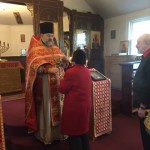On November 29, on the 26th Sunday after Pentecost, and on the feast of the Holy Apostle and Evangelist Matthew, our parish had a nice liturgical celebration. Our Rector, Archpriest Igor Tarasov served the Divine Liturgy. After the Gospel lesson he preached a homily in Russian. An English translation of that homily is as follows:
“Today’s first Gospel lesson offers us a great instruction telling the parable about Good Samaritan. It is interesting to note that those two words were not imaginable by the Jews in the time of Christ. Samaritans were enemies and could not be called “good”. However, our Lord tells this parable and wishes His listeners to change their mind. As we celebrate today the feast of the Holy Apostle Matthew, we learn from the second Gospel lesson that this disciple of Christ was called from the tax office. St. Matthew was a publican, a tax collector. Publicans were considered immoral people and public sinners. Pious Jews could not communicate with them. Therefore, it was not imaginable also to call a publican “good”. But Holy Apostle Matthew became a “good” publican when he followed Christ. Therefore, Jesus was breaking stereotypes of the Jews and wished the people to change their mind regarding “bad” people. By His parable about Good Samaritan He teaches us that God’s commandment of love towards the neighbor concerns all men, and not just our relatives or compatriots. That is the direct and moral sense of that parable.”
“But today we should reflect about the spiritual meaning of that parable.”
“A certain man goes down from Jerusalem to Jericho. A certain man means any man, any one of us. Jerusalem signifies heaven and Jericho signifies the earth. This is the destiny of us all, to be on earth, although our home is in heaven. This man falls among thieves who strip him of his raiment, wounding him and leaving him half-dead (Lk. 10, 30). Here the thieves are the demons who attack us through our weaknesses and wound us, leaving us weak and spiritually dying, having lost grace and faith, in sorrow and despair.”
“A priest and then a Levite pass by and do not help (Lk. 10, 31-32). By them we understand those who, having a certain rank and duty, have hard hearts and show no love, for they are hypocrites and “pass by on the other side”. But a Samaritan helps the man, shows compassion. Although the Samaritan does not share the fullness of the official faith, his heart is kind, and he shows mercy. This Good Samaritan represents Christ Himself. Christ was rejected by the Jews, but had the essential compassion which the Jews did not have.”
“The Samaritan went to the man and bound up his wounds and poured in oil and wine and then set the man on his own animal (Lk. 10, 34). This is what Christ did for us: He came to us. In other words He became man, one of us. He then bound up our spiritual wounds with His word and poured on us His grace of salvation, the oil and wine of our souls. Then he set us on his own animal, in other words he gave us faith. Without faith we are not able to walk, so faith is our ride to salvation, our transport.”
“The Samaritan then took the man to an inn, cared for him and gave the innkeeper two coins to look after the man, telling the innkeeper that if it cost more, he would repay him when he returned. (Lk. 10, 34-35). By the inn, we would understand the Church, where men can receive Christ’s healing and care. Faith transports us to the Church. Then the innkeeper is the priest, the dispenser of sacramental grace and healing. But it is true that all members of the Church are also innkeepers, dispensers of spiritual and other help to those in the world around us.”
“The two coins represent the two ways in which we are saved. First of all, we need to take an effort through, fasting and repentance. That is the first coin. The second coin is the grace of the Sacraments that we receive from God in response to our efforts. And there is a connection between those two coins. If we members of the Church of God, ‘innkeepers’, stretch ourselves and give more of ourselves, then Christ will reward us when He returns at the end of the world.”
“Dear brothers and sisters in Christ! This is the spiritual meaning of today’s parable. Christ tells it to the lawyer who knows the commandments but does not apply them. And Christ says to him: “Go and do likewise” (Lk. 10, 37). Let us also, after reflection on that parable, do likewise by showing compassion towards those who are in need, those whom we encounter during the journey of our life. Today’s second Gospel tells us that our Lord desires compassion, not sacrifice (Mt. 9, 13). Let us show that and take care of our neighbors bodily and spiritually, so when our Lord returns to the earth, He may bless our deeds and reward us for them in the eternity!”
Following the dismissal of the Liturgy the Rector preached a short sermon in English conveying the ideas of his Russian homily. He also reminded the parishioners that we began the Nativity Fast, a period of spiritual preparation for the solemnity of the Birth of Christ.

